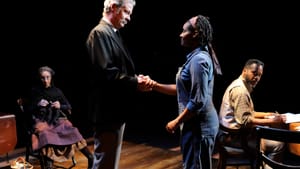Stay in the Loop
BSR publishes on a weekly schedule, with an email newsletter every Wednesday and Thursday morning. There’s no paywall, and subscribing is always free.
Family troubles
Quintessence Theatre Group presents Annie Baker's adaptation of 'Uncle Vanya'

Our second Uncle Vanya of the season (after Hedgerow's in February), Annie Baker’s adapation, gives the 1899 play a darker, more ponderous tone — closer to what, in my experience, has been the typical academic, almost reverential approach to Chekhov's four major plays.
Maybe it's just that Quintessence Theatre Group artistic director Alexander Burns seems to be on firmer footing with drama than comedy, and Uncle Vanya — despite its heartbreak and pathos — plays better when its comedy pours forth unhindered.
Modern feelings
Steven Wright plays the title character. He yearns for his brother-in-law's young wife Yelena (Julia Frey), the sort of woman who is neither surprised nor concerned when men proclaim their love. His mother, Maria (Rosalyn Jamal) tells him, "You used to be lit from within," but at age 47, he's bitter and disillusioned. We soon learn that unrequited love runs rampant on their country estate: Dr. Astrov (Kevin Bergin), who has descended into drink and despair, is also attracted to Yelena and oblivious to the adoration of Vanya's niece Sonya (Jessica M. Johnson).
Others in the household share Vanya's depression about aging: the aches and complaints of Alexander (Dan Kern), Yelena's academician husband, rule the household, and family friend Telegin (David Blatt) maintains a brave front. Susan Chase brings a twinkle of wisdom to the old nanny, and Daniel Ison performs double duty as a workman and pianist on some lovely pieces composed by Randy Redd for use during scene changes.
Baker makes Chekhov's dialogue natural to the American ear, but in this production highlights the characters' maudlin loneliness. However, when this script was performed at the 2016 Shaw Festival, it was not only funnier but at least 20 minutes shorter; the depressive quality comes from making Vanya, Sonya, and Yelena's private ruminations into direct-address soliloquies in Burns's arena staging. The audience sits close to all four sides of a square platform, and silences and slow lighting fades draw out the play's more morose feelings. This Uncle Vanya's characters wallow indulgently in ways that seem too openly contemporary.
Modern inconveniences
Burns's production features Christina Lorraine Bullard's modern-looking costumes, especially on Sonya (denim overalls, a short summer dress) and Yelena (form-fitting cocktail dresses, wedge heels). An old-looking Russian samovar sits next to pill bottles from the local pharmacy. Astrov's forest maps seem made with bright markers. Is this Vanya set in our time and not Chekhov's 1890s? The disconnect adds to the dialogue's stilted feeling; the words seem too formal for the casual clothing and angsty, overwrought acting (Vanya suddenly standing on a chair during a big speech jumps the shark). John Burkland lights the challenging four-sided stage well, but uses bold white spots that literally highlight emotional excesses.
Moreover, Burns appears to want to make some vague color-conscious point with casting. Wright, Jamal (as Vanya's mother), Johnson (Vanya's sister's daughter) and Ison (the servant) are African-American in an otherwise white cast, a choice that doesn't add to our appreciation of the play. They're all capable actors, particularly Johnson, who embodies an earnest, hopeful ray of sunshine in an otherwise dreary home — but their characters are all subservient. However, Alexander mistreats them because he's oblivious, not because of their ethnicity. There's no evidence in the performances that Astrov rejects Sonya or Yelena prefers friendship with Vanya because of racial difference.
We Americans are sensitive about race, of course. Colorblind casting — which Quintessence typically practices — works to overcome this as well as to provide much-deserved opportunities for actors of color, but this deliberate casting suggests a meaning not revealed in the play. In Romeo and Juliet, for example, casting the warring Montague and Capulet families as different ethnicities has a clear modern connotation.
This Uncle Vanya may confirm for some people that Anton Chekhov's plays are tedious, dreary, and dated. They don't have to be.
To read Alexander Burns's response to this review, click here.
What, When, Where
Uncle Vanya. By Anton Chekhov, adapted by Annie Baker, Alexander Burns directed. Quintessence Theatre Group. Through June 18, 2017, at the Sedgwick Theater, 7317 Germantown Avenue, Philadelphia. (215) 987-4450 or quintessencetheatre.org.
Sign up for our newsletter
All of the week's new articles, all in one place. Sign up for the free weekly BSR newsletters, and don't miss a conversation.

 Mark Cofta
Mark Cofta